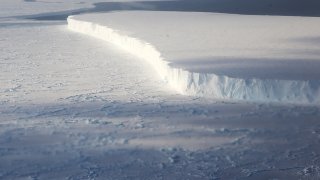
ANTARCTICA – OCTOBER 27: A tabular iceberg floats near the coast of West Antarctica as seen from a window of a NASA Operation IceBridge airplane on October 27, 2016 in-flight over Antarctica. Tabular icebergs can measure many miles in length and are often formed after calving from ice shelves. NASA’s Operation IceBridge has been studying how polar ice has evolved over the past eight years and is currently flying a set of 12-hour research flights over West Antarctica at the start of the melt season. Researchers have used the IceBridge data to observe that the West Antarctic Ice Sheet may be in a state of irreversible decline directly contributing to rising sea levels. NASA and University of California, Irvine (UCI) researchers have recently detected the speediest ongoing Western Antarctica glacial retreat rates ever observed. The United Nations climate change talks begin November 7 in the Moroccan city of Marrakech. (Photo by Mario Tama/Getty Images)
The U.N. weather agency said Friday that an Argentine research base on the northern tip of Antarctica is reporting a temperature that, if confirmed, could be a record high for the icy continent.
World Meteorological Organization spokeswoman Clare Nullis, citing figures from Argentina's national weather service, said the Esperanza base recorded 18.3 degrees C elsius ( 64.9 Fahrenheit) on Thursday — topping the former record of 17.5 degrees tallied in March 2015.
The WMO's committee that draws on the agency's weather and climate archives is now expected to verify whether the reading would amount to a new record.
“Everything we have seen thus far indicates a likely legitimate record but we will of course begin a formal evaluation of the record once we have full data from SMN and on the meteorological conditions surrounding the event," said WMO’s Weather and Climate Extremes rapporteur, Randal Cerveny, referring to the acronym for Argentina's weather service.
Get South Florida local news, weather forecasts and entertainment stories to your inbox. Sign up for NBC South Florida newsletters.
"The record appears to be likely associated (in the short term) with what we call a regional ‘foehn’ event over the area," Cerveny said, defining it as a rapid warming of air coming down a slope or mountain.
WMO says the Antarctic Peninsula, on the continent's northwest tip near South America, is among the fastest warming regions on Earth—at almost 3 degrees Celsius over the last half-century.
Some 87 percent of glaciers along the west coast of the peninsula have retreated over that 50-year span, with most showing “an accelerated retreat” over the last 12 years, WMO said.